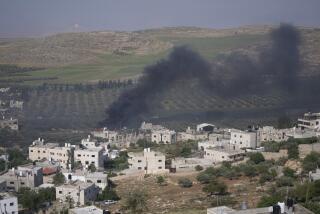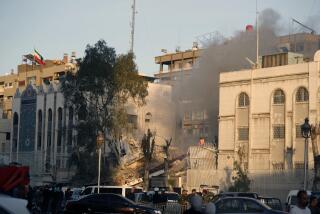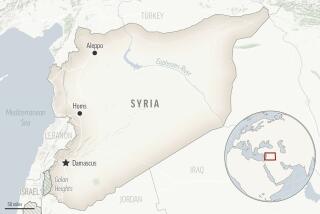Israel fires on pro-Palestinian protesters; 20 reported killed
Israeli security forces opened fire Sunday on throngs of pro-Palestinian protesters who were attempting to breach the border by crossing from Syria into the Golan Heights, the second such deadly incident in less than a month.
As many as 20 protesters were killed and 270 others were wounded, according to Syria’s state-run news agency. Israeli officials said they could not confirm the casualty figures. The toll could not be independently verified.
The violence, which came during protests to mark the 44th anniversary of Israel’s capture of the Golan Heights during the 1967 Middle East War, was the latest sign that regional unrest in the Arab world is beginning to affect Israel.
Similar protests last month left 12 people dead after Israeli and Lebanese forces fired on crowds that stormed the borders from Syria and Lebanon.
Israeli officials said Sunday that they first fired warning shots at several hundred protesters who rushed over the Syrian border and ran into a mine-laden buffer zone that separates the Golan Heights.
By Sunday night, scores of protesters remained camped along the Syrian border, refusing to leave despite tear gas volleys and periodic warning shots fired by Israeli soldiers. Many lighted bonfires and appeared to be preparing to spend the night outside.
Israel blamed Syrian authorities for failing to prevent protesters from amassing on the other side of the border, accusing President Bashar Assad of fostering the violence in an attempt to distract from his own government’s deadly crackdown on domestic protesters calling for him to step down.
“This is yet another attempt by the Syrian regime to divert attention from the bloodshed taking place there,” said Israel Defense Forces spokeswoman Lt. Col. Avital Leibovitz. She said Israeli forces aimed at protesters’ legs.
“We have to protect our borders like any other country,” Leibovitz said.
But the death toll led some in Israel to call for a review of the military’s rules of engagement to reduce the use of deadly force, particularly if border demonstrations continue.
The clashes took place near the Golan Heights towns of Majdal Shams and Quneitra. Al Jazeera television aired pictures showing demonstrators near Majdal Shams waving Palestinian flags, ducking for cover from Israeli fire and carrying away wounded protesters.
Demonstrators but threw rocks and trash at the Israeli soldiers, officials said.
At one point, protests spread to the other side of the border, where several hundred rock-throwing Druze youths in Majdal Shams clashed briefly with Israeli soldiers. Local religious leaders intervened to calm the youths, who appeared to be demonstrating their support for Palestinian and Syrian protesters.
Arab residents of the town, who were previously Syrians and then received Israeli citizenship when Israel annexed the Golan Heights, say they have found themselves caught in the middle of the border protests.
Near Quneitra, protesters from Syria lobbed Molotov cocktails at Israeli soldiers and caused a fire that set off four land mines, injuring some demonstrators, Israeli officials said.
Israel had been preparing for two weeks for the so-called Naksa Day, the Arabic word for “setback,” which commemorates the start of the 1967 war in which Israel seized control of the West Bank, Golan Heights, Gaza Strip and Sinai peninsula. (Israel has since withdrawn from the Sinai and Gaza.) Amid calls on Facebook pages for mass demonstrations, Israel’s military dispatched thousands of soldiers along its borders and around Jerusalem, where Palestinian protesters also clashed Sunday with Israeli forces.
After the May 15 protests, which took soldiers largely by surprise, Israel has reinforced its borders in recent days — laying coils of razor wire, planting new mines and digging trenches. Officials said soldiers were equipped with special riot gear and crowd-control equipment to reduce the need for live fire.
But officials warned that Israel would use deadly force to prevent penetration of its borders.
During a Cabinet meeting Sunday, Israeli Prime Minister Benjamin Netanyahu said he ordered the military to act with “maximum restraint but with determination in order to safeguard our sovereignty, our borders, our communities and our citizens.”
On Saturday, the Lebanese government, reportedly in response to pressure from the U.S. and United Nations, declared that it would close its border region, in effect foiling a simultaneous protest that had been planned there.
More to Read
Start your day right
Sign up for Essential California for news, features and recommendations from the L.A. Times and beyond in your inbox six days a week.
You may occasionally receive promotional content from the Los Angeles Times.






